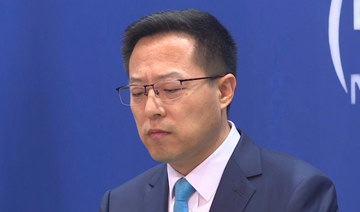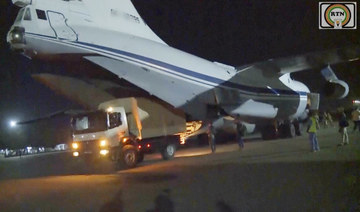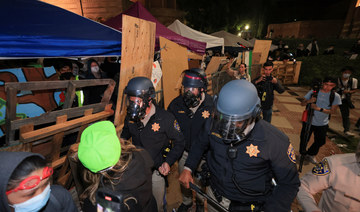SYDNEY: US officials say they have little fear that China would attack Nancy Pelosi’s plane if she flies to Taiwan. But the US House speaker would be entering one of the world’s hottest spots where a mishap, misstep or misunderstanding could endanger her safety. So the Pentagon is developing plans for any contingency.
Officials told The Associated Press that if Pelosi goes to Taiwan — still an uncertainty — the military would increase its movement of forces and assets in the Indo-Pacific region. They declined to provide details, but said that fighter jets, ships, surveillance assets and other military systems would likely be used to provide overlapping rings of protection for her flight to Taiwan and any time on the ground there.
Any foreign travel by a senior US leader requires additional security. But officials said this week that a visit to Taiwan by Pelosi — she would be the highest-ranking US elected official to visit Taiwan since 1997 — would go beyond the usual safety precautions for trips to less risky destinations.
Asked about planned military steps to protect Pelosi in the event of a visit, US Gen. Mark Milley, chairman of the Joint Chiefs of Staff, said Wednesday that discussion of any specific travel is premature. But, he added, “if there’s a decision made that Speaker Pelosi or anyone else is going to travel and they asked for military support, we will do what is necessary to ensure a safe conduct of their visit. And I’ll just leave it at that.”
China considers self-ruling Taiwan its own territory and has raised the prospect of annexing it by force. The US maintains informal relations and defense ties with Taiwan even as it recognizes Beijing as the government of China.
The trip is being considered at a time when China has escalated what the US and its allies in the Pacific describe as risky one-on-one confrontations with other militaries to assert its sweeping territorial claims. The incidents have included dangerously close fly-bys that force other pilots to swerve to avoid collisions, or harassment or obstruction of air and ship crews, including with blinding lasers or water cannon.
Dozens of such maneuvers have occurred this year alone, Ely Ratner, US assistant defense secretary, said Tuesday at a South China Sea forum by the Center for Strategic and International Studies. China denies the incidents.
The US officials, who spoke on condition of anonymity to discuss sensitive security issues, described the need to create buffer zones around the speaker and her plane. The US already has substantial forces spread across the region, so any increased security could largely be handled by assets already in place.
The military would also have to be prepared for any incident — even an accident either in the air or on the ground. They said the US would need to have rescue capabilities nearby and suggested that could include helicopters on ships already in the area.
Pelosi, D-Calif., has not publicly confirmed any new plans for a trip to Taiwan. She was going to go in April, but she postponed the trip after testing positive for COVID-19.
The White House on Monday declined to weigh in directly on the matter, noting she had not confirmed the trip. But President Joe Biden last week raised concerns about it, telling reporters that the military thinks her trip is “not a good idea right now.”
A Pelosi trip may well loom over a call planned for Thursday between Biden and Chinese President Xi Jinping, their first conversation in four months. A US official confirmed plans for the call to The Associated Press on condition of anonymity ahead of the formal announcement.
US officials have said the administration doubts that China would take direct action against Pelosi herself or try to sabotage the visit. But they don’t rule out the possibility that China could escalate provocative overflights of military aircraft in or near Taiwanese airspace and naval patrols in the Taiwan Strait should the trip take place. And they don’t preclude Chinese actions elsewhere in the region as a show of strength.
Security analysts were divided Tuesday about the extent of any threat during a trip and the need for any additional military protection.
The biggest risk during Pelosi’s trip is of some Chinese show of force “gone awry, or some type of accident that comes out of a demonstration of provocative action,” said Mark Cozad, acting associate director of the International Security and Defense Policy Center at the Rand Corp. “So it could be an air collision. It could be some sort of missile test, and, again, when you’re doing those types of things, you know, there is always the possibility that something could go wrong.”
Barry Pavel, director of the Scowcroft Center for Strategy and Security at the Atlantic Council, scoffed at US officials’ reported consideration of aircraft carriers and warplanes to secure the speaker’s safety. “Obviously, the White House does not want the speaker to go and I think that’s why you’re getting some of these suggestions.”
“She’s not going to go with an armada,” Pavel said.
They also said that a stepped-up US military presence to safeguard Pelosi risked raising tensions.
“It is very possible that ... our attempts to deter actually send a much different signal than the one we intend to send,” Cozad said. “And so you get into ... some sort of an escalatory spiral, where our attempts to deter are actually seen as increasingly provocative and vice versa. And that can be a very dangerous dynamic.”
On Monday, Chinese Foreign Ministry spokesperson Zhao Lijian said Beijing had repeatedly expressed its “solemn position” over a potential Pelosi visit. He told reporters that China is prepared to “take firm and strong measures to defend national sovereignty and territorial integrity.”
Milley said this week that the number of intercepts by Chinese aircraft and ships in the Pacific region with US and other partner forces has increased significantly over the past five years. He said Beijing’s military has become far more aggressive and dangerous, and that the number of unsafe interactions has risen by similar proportions.
Those include reports of Chinese fighter jets flying so close to a Canadian air security patrol last month that the Canadian pilot had to swerve to avoid collision, and another close call with an Australian surveillance flight in late May in which the Chinese crew released a flurry of metal scraps that were sucked into the other plane’s engine.
US officials say that the prospects of an intercept or show of force by Chinese aircraft near Pelosi’s flight raises concerns, prompting the need for American aircraft and other assets to be nearby.
The US aircraft carrier USS Ronald Reagan and its strike group is currently operating in the western Pacific, and made a port call in Singapore over the weekend. The strike group involves at least two other Navy ships and Carrier Air Wing 5, which includes F/A-18 fighter jets, helicopters and surveillance aircraft.
Prior to pulling into port in Singapore, the strike group was operating in the South China Sea. In addition, another Navy ship, the USS Benfold, a destroyer, has been conducting freedom of navigation operations in the region, including a passage through the Taiwan Strait last week.
US military making plans in case Nancy Pelosi travels to Taiwan
https://arab.news/bsmam
US military making plans in case Nancy Pelosi travels to Taiwan

- Military would increase its movement of forces and assets in the Indo-Pacific region if Pelosi travels to Taiwan
- US President Joe Biden last week raised concerns about it, saying military thinks her trip is ‘not a good idea right now’
Cockfights still rule the roost in India’s forest villages

- India is renowned for its fanatical cricket obsession but in the central state of Chhattisgarh, cockfighting draws the crowds
- When a cockfight is on calendar, hundreds of men walk far across rivers, through dense bushland and over hills for ringside view
KATEKALYAN: The swing of a talon and a flurry of feathers leaves a rooster motionless, a cockfight bout viewed as cruel by many but which binds disparate Indian forest communities together.
India is renowned for its fanatical cricket obsession but in the central state of Chhattisgarh, cockfighting draws the crowds.
“Earlier there was no other entertainment and it helped us meet people from other villages,” Raju, whose skill in raising fighting fowl has made him something of a local celebrity, told AFP.
“Even with all the changes around us today, the sport is still very popular,” the 32-year-old added.
The forests of Bastar district are home to numerous tribal communities living in scattered villages.
India has pumped millions of dollars into infrastructure development, and new roads and mobile phone towers have brought the forest’s inhabitants somewhat closer to the outside world.
Rugged terrain and the tyranny of distance in remote Bastar district still lend few occasions for these villages to interact with each other.
But when a cockfight is on the calendar, hundreds of men will walk far across rivers, through dense bushland and over hills to get a ringside view.
“I do nothing but organize fights, raise roosters and place bets,” Bhagat, 35, of Katekalyan village told AFP.
Last month was Katekalyan’s turn to host a bout, with men from out of town ringing the fence of the dirt enclosure where roosters spar.
Most cockfights are over in the blink of an eye, with the pre-game pageantry accounting for most of the action.
Bhagat and a rival rooster owner first hold their bird’s beak to beak to gauge whether they have the necessary hostility to battle.
Both men then use twine to fix sharp blades to the claws of their charges as the crowd shouts out their small wagers on the outcome.
Along with much of the rest of the world, cockfighting is banned in numerous Indian states on animal cruelty grounds.
People for the Ethical Treatment of Animals (PETA) India calls cockfighting “barbaric,” and campaigns to shut it down for good.
But the men living in Bastar’s forests see it as an integral part of their community fabric.
Roosters that survive multiple bouts are lauded alongside their owners.
Raju said the most enduring fighters were locally remembered with the same reverence that the rest of India holds for cricketing greats like former captain Sachin Tendulkar.
“Like you have a field for cricket, this is our field,” he said.
“And the winners get fame and respect, just like Sachin did by scoring all his runs.”
Bhagat said it always grieved him when one of his animals died in combat.
“When we lose a rooster in the fight, our hearts are in pain for a few days,” he said.
“But then we get drunk, and then there will be peace.”
Russian troops enter base housing US military in Niger, US official says
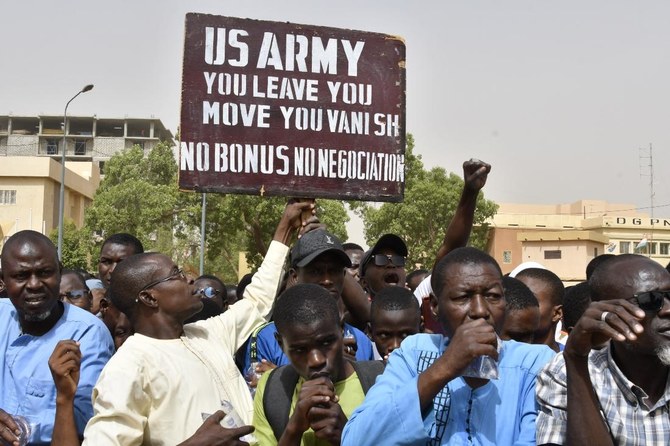
- The US and its allies have been forced to move troops out of a number of African countries following coups
WASHINGTON: Russian military personnel have entered an air base in Niger that is hosting US troops, a senior US defense official told Reuters, a move that follows a decision by Niger’s junta to expel US forces.
The military officers ruling the West African nation have told the US to withdraw its nearly 1,000 military personnel from the country, which until a coup last year had been a key partner for Washington’s fight against insurgents who have killed thousands of people and displaced millions more.
A senior US defense official, speaking on condition of anonymity, said Russian forces were not mingling with US troops but were using a separate hangar at Airbase 101, which is next to Diori Hamani International Airport in Niamey, Niger’s capital.
The move by Russia’s military, which Reuters was the first to report, puts US and Russian troops in close proximity at a time when the nations’ military and diplomatic rivalry is increasingly acrimonious over the conflict in Ukraine.
It also raises questions about the fate of US installations in the country following a withdrawal.
“(The situation) is not great but in the short-term manageable,” the official said.
Asked about the Reuters report, US Defense Secretary Lloyd Austin played down any risk to American troops or the chance that Russian troops might get close to US military hardware.
“The Russians are in a separate compound and don’t have access to US forces or access to our equipment,” Austin told a press conference in Honolulu.
“I’m always focused on the safety and protection of our troops ... But right now, I don’t see a significant issue here in terms of our force protection.”
The Nigerien and Russian embassies in Washington did not immediately respond to a request for comment.
The US and its allies have been forced to move troops out of a number of African countries following coups that brought to power groups eager to distance themselves from Western governments. In addition to the impending departure from Niger, US troops have also left Chad in recent days, while French forces have been kicked out of Mali and Burkina Faso.
At the same time, Russia is seeking to strengthen relations with African nations, pitching Moscow as a friendly country with no colonial baggage in the continent.
Mali, for example, has in recent years become one of Russia’s closest African allies, with the Wagner Group mercenary force deploying there to fight jihadist insurgents.
Russia has described relations with the United States as “below zero” because of US military and financial aid for Ukraine in its effort to defend against invading Russian forces.
The US official said Nigerien authorities had told President Joe Biden’s administration that about 60 Russian military personnel would be in Niger, but the official could not verify that number.
After the coup, the US military moved some of its forces in Niger from Airbase 101 to Airbase 201 in the city of Agadez. It was not immediately clear what US military equipment remained at Airbase 101.
The United States built Airbase 201 in central Niger at a cost of more than $100 million. Since 2018 it has been used to target Islamic State and Al-Qaeda affiliate Jama’at Nusrat Al-Islam wal Muslimeen (JNIM) fighters with armed drones.
Washington is concerned about Islamic militants in the Sahel region, who may be able to expand without the presence of US forces and intelligence capabilities.
Niger’s move to ask for the removal of US troops came after a meeting in Niamey in mid-March, when senior US officials raised concerns including the expected arrival of Russia forces and reports of Iran seeking raw materials in the country, including uranium.
While the US message to Nigerien officials was not an ultimatum, the official said, it was made clear US forces could not be on a base with Russian forces.
“They did not take that well,” the official said.
A two-star US general has been sent to Niger to try and arrange a professional and responsible withdrawal.
While no decisions have been taken on the future of US troops in Niger, the official said the plan was for them to return to US Africa Command’s home bases, located in Germany.
’Show solidarity’: Pro-Palestinian protesters camp across Australian universities
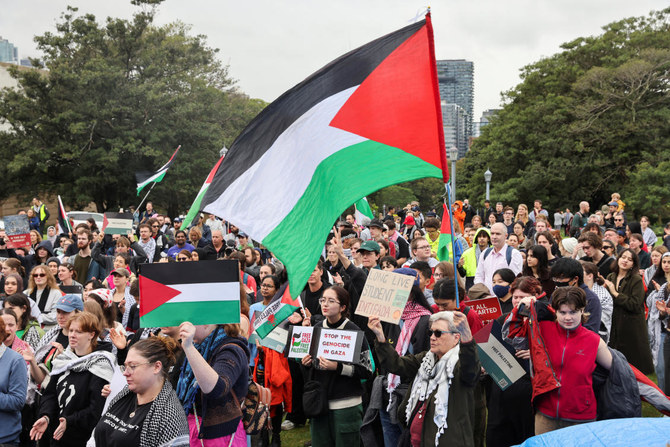
- Pro-Palestinian activists set up an encampment last week outside the sandstone main hall at University of Sydney
- Similar camps have sprung up at universities in Melbourne, Canberra and other Australian cities
SYDNEY: Hundreds of people protesting Israel’s war in Gaza rallied at one of Australia’s top universities on Friday demanding it divest from companies with ties to Israel, in a movement inspired by the student occupations sweeping US campuses.
Pro-Palestinian activists set up an encampment last week outside the sandstone main hall at University of Sydney, one of Australia’s largest tertiary institutions.
Similar camps have sprung up at universities in Melbourne, Canberra and other Australian cities.
Unlike in the US, where police have forcibly removed scores of defiant pro-Palestinian protesters at several colleges, protest sites in Australia have been peaceful with scant police presence.
On Friday, protesters rallied to demand University of Sydney divest from companies with ties to Israel, echoing calls from students in the US, Canada and France.
Standing in the chanting crowd of more than 300 with his two-year old son on his shoulders, Matt, 39, said he came to show it was not just students angry at Israel’s actions in Gaza.
“Once you understand what is going on you have a responsibility to try and get involved and raise awareness and show solidarity,” he told Reuters, declining to give his last name.
Several hundred meters away from the Sydney university protest and separated by lines of security guards, hundreds gathered under Australian and Israeli flags to hear speakers say the pro-Palestinian protests made Jewish students and staff feel unsafe on campus.
“There’s no space for anybody else, walking through campus chanting ‘Intifada’ and ‘from the river to the sea’ it does something, it’s scary,” said Sarah, an academic who declined to give her name for fear of repercussions.
University of Sydney vice chancellor Mark Scott told local media on Thursday the pro-Palestinian encampment could stay on campus in part because there was not the violence seen in the US
While several police cars were parked at the entrance to the university, no police were present at either protest.
Long a stalwart ally of Israel, Australia has become increasingly critical of its conduct in Gaza, where an Australian aid worker was killed in an Israeli attack last month.
Pro-Palestinian protesters said the government had not done enough to push for peace and led the crowd in chants against Prime Minister Anthony Albanese and his government.
UK’s Labour claim big early win over PM Sunak’s Conservatives

- Voters cast their ballots on Thursday for more than 2,000 seats on local authorities across England
- Blackpool South was the only parliamentary seat up for grabs after the incumbent, elected in 2019 as a Conservative candidate, quit over a lobbying scandal
LONDON: Britain’s opposition Labour Party won a parliamentary seat in northern England on Friday, inflicting a heavy loss on the governing Conservatives at the start of what could be a bruising set of results for Prime Minister Rishi Sunak.
The thumping victory set the tone for what will be a closely watched two days of results ahead of a full national election this year, which polling shows could put Labour Leader Keir Starmer in power and end 14 years of Conservative government.
Voters cast their ballots on Thursday for more than 2,000 seats on local authorities across England and a handful of high-profile mayoral elections, including in the capital, London.
Blackpool South was the only parliamentary seat up for grabs after the incumbent, elected in 2019 as a Conservative candidate, quit over a lobbying scandal.
Labour candidate Chris Webb won the Blackpool election with 10,825 votes. The Conservative candidate came in second with 3,218.
The defeat in Blackpool and early signs of losses at the council level will boost Labour’s hopes for a sweeping victory over Sunak’s Conservatives in the national election.
“This seismic win in Blackpool South is the most important result today,” Starmer said.
“This is the one contest where voters had the chance to send a message to Rishi Sunak’s Conservatives directly, and that message is an overwhelming vote for change.”
Sunak’s Conservatives are about 20 percentage points behind Labour in most opinion polls for a national election, which Sunak intends to call in the second half of the year.
The first 500 of the more than 2,600 local council results showed Labour making gains at the expense of the Conservatives — in line with finance minister Jeremy Hunt’s pre-vote prediction of significant losses for the governing party.
Although local elections do not always reflect how people will vote in a national contest, a heavy defeat could trigger fresh anger in the Conservative Party over Sunak’s leadership and the prospect of losing power.
The extent of that unrest could hinge on the results of two mayoral elections in which the Conservatives hope to show they can still hold ground in central and northeast England.
The Tees Valley mayoral result is due on Friday, while the West Midlands mayor is to be announced on Saturday. The result in London, where current Labour mayor Sadiq Khan is expected to win another term is also due on Saturday.
More than 2,100 people have been arrested during pro-Palestinian protests on US college campuses

- At least 50 incidents of arrests have happened at 40 different US colleges or universities since April 18
- The demonstrations began at Columbia on April 17 with students calling for an end to the Israel-Hamas war
LOS ANGELES: Police have arrested more than 2,100 people during pro-Palestinian protests at college campuses across the United States in recent weeks, sometimes using riot gear, tactical vehicles and flash-bang devices to clear tent encampments and occupied buildings. One officer fired his gun inside a Columbia University administration building while clearing out protesters camped inside, a prosecutor’s office confirmed.
No one was injured by the officer’s actions late Tuesday inside Hamilton Hall on the Columbia campus, according to Doug Cohen, a spokesperson for District Attorney Alvin Bragg’s office. Cohen said Thursday that the gun did not appear to be aimed at anyone, and that there were other officers but no students in the immediate vicinity. Bragg’s office is conducting a review, a standard practice.
More than 100 people were taken into custody during the Columbia crackdown, just a fraction of the total arrests stemming from recent campus protests over the Israel-Hamas war. A tally by The Associated Press on Thursday found at least 50 incidents of arrests at 40 different US colleges or universities since April 18.
Early Thursday, officers surged against a crowd of demonstrators at University of California, Los Angeles, ultimately taking at least 200 protesters into custody after hundreds defied orders to leave, some forming human chains as police fired flash-bangs to break up the crowds. Police tore apart a fortified encampment’s barricade of plywood, pallets, metal fences and dumpsters, then pulled down canopies and tents.
Like at UCLA, tent encampments of protesters calling on universities to stop doing business with Israel or companies they say support the war in Gaza have spread across other campuses nationwide in a student movement unlike any other this century. Iranian state television carried live images of the police action at UCLA, as did Qatar’s pan-Arab Al Jazeera satellite network. Live images of Los Angeles also played across Israeli television networks.
Israel has branded the protests antisemitic, while Israel’s critics say it uses those allegations to silence opposition. Although some protesters have been caught on camera making antisemitic remarks or violent threats, protest organizers — some of whom are Jewish — call it a peaceful movement to defend Palestinian rights and protest the war.
President Joe Biden on Thursday defended the right of students to peaceful protest but decried the disorder of recent days.
Opinion
This section contains relevant reference points, placed in (Opinion field)
The demonstrations began at Columbia on April 17 with students calling for an end to the Israel-Hamas war, which has killed more than 34,000 Palestinians in the Gaza Strip, according to the Health Ministry there. Israel launched its offensive in Gaza after Hamas militants killed about 1,200 people, mostly civilians, on Oct. 7 and took roughly 250 hostages in an attack on southern Israel.
On April 18, the NYPD cleared Columbia’s initial encampment and arrested roughly 100 protesters. The demonstrators set up new tents and defied threats of suspension, and escalated their actions early Tuesday by occupying Hamilton Hall, an administration building that was similarly seized in 1968 by students protesting racism and the Vietnam War.
Roughly 20 hours later, officers stormed the hall. Video showed police with zip ties and riot shields streaming through a second-floor window. Police had said protesters inside presented no substantial resistance. At some point, the officer’s gun went off inside the building. Cohen, the DA’s spokesperson, did not provide additional details on the incident, which was first reported by news outlet The City on Thursday. The NYPD did not immediately respond to AP’s request for comment.
The confrontations at UCLA also played out over several days this week. UCLA Chancellor Gene Block told alumni on a call Thursday afternoon that the trouble started after a permitted pro-Israel rally was held on campus Sunday and fights broke out and “live mice” were tossed into the pro-Palestinian encampment later that day.
In the following days, administrators tried to find a peaceful solution with members of the encampment and expected things to remain stable, Block said.
That changed late Tuesday, he said, when counterdemonstrators attacked the pro-Palestinian encampment. Campus administrators and police did not intervene or call for backup for hours. No one was arrested that night, but at least 15 protesters were injured. The delayed response drew criticism from political leaders, including California Gov. Gavin Newsom, and officials pledged an independent review.
“We certainly weren’t thinking that we’d end up with a large number of violent people, that hadn’t happened before,” Block said on the call.
By Wednesday, the encampment had become “much more of a bunker” and there was no other solution but to have police dismantle it, he said.
The hourslong standoff went into Thursday morning as officers warned over loudspeakers that there would be arrests if the crowd — at the time more than 1,000 strong inside the encampment as well as outside of it — did not disperse. Hundreds left voluntarily, while another 200-plus remained and were ultimately taken into custody.
Meanwhile, protest encampments at other schools across the US have been cleared by police — resulting in more arrests — or closed up voluntarily. But University of Minnesota officials reached an agreement with protesters not to disrupt commencements, and similar compromises have been made at Northwestern University in suburban Chicago, Rutgers University in New Jersey and Brown University in Rhode Island.
Ariel Dardashti, a graduating UCLA senior studying global studies and sociology, said no student should feel unsafe at school.
“It should not get to the point where students are being arrested,” Dardashti said on campus Thursday.




